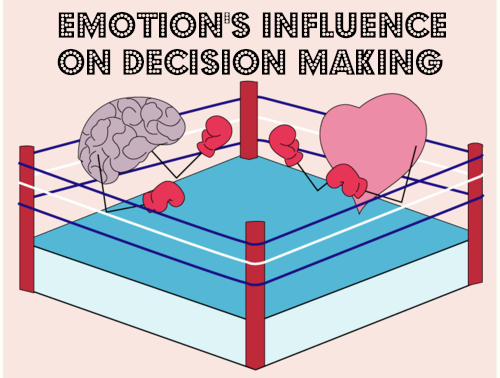News: Now offering SSO.
Learn more
News: Now offering SSO.
Learn more
How Emotions Influence Sales Decision Making
How do you make decisions? Most people claim they make decisions rationally. The truth is, we decide with emotion and justify our decisions with logic. Have you been to Starbucks this week? Why did you choose Starbucks and not the cheaper cafe next door?
It’s not because of better coffee or friendlier staff, but the feeling Starbucks sells along with its drinks. Modern design and fancy names, the social acceptance you get from your visit because all the cool kids go there, and the reassurance that you get the same product wherever you go are what makes Starbucks influential.
To be successful in today’s business world, you need to sell more than just the product. You sell feelings that come with the purchase, the upscale position it puts your customers in and the emotions it evokes in them. You’re selling a dream along with your product - to help customers become a better version of themselves. To be successful, you want to make use of your prospects' emotions' influence on decision making. Emotional selling marks the difference between average businesses and top companies.
Emotional selling means arousing emotions in prospects to persuade them into buying your product. Every decision we make is influenced by emotion. According to Peter Noel Murray, when you’re facing a decision, feelings from past experiences will create bias in your choice. This is because our brain’s limbic system constantly looks for positive feelings. Hence, if we associate positive or negative feelings with a certain event, our brain will either lead us to make the same decision again, or refrain from it.
The notion of emotion is crucial to understand if you want to be a great sales rep. Want to have prospects purchase your product? Then trigger the right feelings in them:
Keep in mind that your words, clothes and manners will arouse emotions - positive or negative - in the prospect’s mind and potentially ruin your sale. Emotions often connect to past experiences, thus, if you look like the prospect’s crazy ex or speak like their least favorite math teacher, your chances of making the sale decline dramatically without you even knowing.
Instead of focusing on features, focus on selling the experiences and feelings that arise from using your product. Point out how your solution adds value to your prospects’ lives while helping avoiding inconveniences. How does your product change your customer’s life?
Use passion to communicate value to your prospects. Show them why you believe in your product and that you stand by it 110%. If you trust your solution, your customers will do the same. Remember, you usually only have a few minutes with a prospect to convince him, so use your time wisely. Reassure your prospects your product is the best option in the market because of the value it brings into their lives. Help them discover what feels right instead of telling them what is right.
Emotions can be tricky and hard to read, which makes emotional intelligence all the more important. Emotional intelligence, according to Psychology Today, “is the ability to identify and manage your own emotions and the emotions of others”. You need to be able to understand your prospects’ character and feelings if you want to sell to them. Nothing worse than infuriating a customer, right?
Emotional intelligence is distinct from logical reasoning ability or linguistic skill, which are what an IQ test evaluates. It's easy for us to see that some people, especially someone with Asperger's Syndrome, can be remarkably good at solving logic problems, and yet have to put extraordinary effort into understanding social customs, interpreting social cues, or managing their own emotional responses.
Consistency is key in approaching your customers. Within seconds you need to select an emotional strategy suitable for your prospects and stick with it. Don’t try and trigger every emotion at once. If anything, it leaves your customer confused and unwilling buy. Figure out how you can effectively convince your prospects.
To play on the right emotions, conduct research on the prospects up front. This helps you understand which approach they are most vulnerable to. Is your prospect known for being vain or super ambitious? Trigger feelings of achievement. Do they face the threat of a competitor? Communicate the costs of inaction.
How Badger Helps You Sell to Emotions
Badger Maps helps you sell to your prospect’s emotions. The app saves you time by scheduling and optimizing your routes for you. The newly freed-up time could, for instance, be used to conduct research on your customers to figure out an appropriate emotional selling strategy. Don’t waste any more time on routing but start dedicating it to the customer!
Have you noticed anything extraordinary about a customer, such as high self-esteem or fear of competition?
Put it down in the notes section of the Badger app.
Once you meet with the prospect again you can refer to your records and use the information to make the sale.
You will be more trustworthy, if you are better organized. Being capable of good time management and working efficiently, you’re a good fit for your prospect’s problem. In other words, your sale comes into reach.
Badger Maps allows you to do all these things and more. Use Badger to benefit from emotion's influence on decision making and sell to people's feelings.
Learn how you can maximize your sales routes & sell more with Badger Maps
Badger Maps is a routing & mapping app that automates data collection and uplevels field team performance. From planning your day to managing your territories, Badger optimizes every aspect of the field sales process.
Looking for our logo?
Grab a Zip packed with our logo in PNG and EPS formats.
Get Started now with a free trial of Badger Maps, no credit card required!
free trial